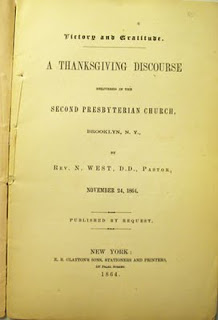Although we traditionally trace the origins of this holiday to the Pilgrims’ first Thanksgiving celebration in 1621, it did not become an annual celebration in the United States until 1863 and a federal holiday in 1941. In the colonial era, days of thanksgiving were designated throughout the year by individual colonies as a time for prayer and fasting. After the Revolutionary War, Thanksgiving days were occasionally proclaimed by American presidents or governors of individual states. During the Civil War, President Abraham Lincoln issued a proclamation on October 3, 1863, proclaiming a national Thanksgiving to be celebrated on the last Thursday of November.
The Clements Library collections include a wide array of materials related to Thanksgiving in American history, beginning with early colonial observances and continuing through the 19th century. To offer a glimpse of these rich holdings, the following items from the collection all describe a single date: Thanksgiving, November 24, 1864. Through printed materials and manuscripts centering on this particular date, we can see how Americans experienced this holiday in the midst of the Civil War.
 The Union League Club’s “Report of the committee on providing a Thanksgiving Dinner for the soldiers and sailors, presented December 14th, 1864.” Includes copies of correspondence among the organizers, a description of the event, lists of those who contributed money or food for the dinner, and a summary of the expenses ($57,102.33).
The Union League Club’s “Report of the committee on providing a Thanksgiving Dinner for the soldiers and sailors, presented December 14th, 1864.” Includes copies of correspondence among the organizers, a description of the event, lists of those who contributed money or food for the dinner, and a summary of the expenses ($57,102.33).
During the Civil War, the Union League Club of New York determined to provide a Thanksgiving dinner to every soldier and sailor in the Union Army on November 24, 1864. They solicited donations from Northern citizens and distributed shipments of food for the dinner to as many of the army regiments and navy vessels as they could reach. The main challenges were to organize the donations pouring in from every Northern state, and keep the food from spoiling during transport by ship or railway to the different encampments. It was estimated that at least 373,586 lbs. of poultry was provided for the occasion, in addition to “an enormous quantity of cakes, doughnuts, gingerbread, pickles, preserved fruits, apples, vegetables, and all the other things which go to make up a Northern Thanksgiving Dinner.” The organizers declared the effort a “grand success.”
 Benjamin C. Lincoln to Dora F. Lincoln, November 26, 1864
Benjamin C. Lincoln to Dora F. Lincoln, November 26, 1864
Writing to his wife from his post in Key West, Florida, during the Civil War, Benjamin Lincoln described the Thanksgiving dinner he had on the 24th. At that time, Benjamin Lincoln was a major with the 2nd United States Infantry Regiment (Colored).
“Thanksgiving night we had a first rate supper which Mrs. French & Weeks prepared. Some most excellent cakes and other things which I did not think possible to manufacture on this Island. We had a very pleasant time after supper all our officers were together and had a social chat.
I wished you were here but then wishes did not bring you, so I shall have to remain content until you can come, whenever that happy event may be.”
 On the same day, at the Second Presbyterian Church, Brooklyn, New York, the Rev. N. West delivered a sermon titled “Victory and Gratitude. A Thanksgiving Discourse.” His was one of many Thanksgiving sermons delivered on November 24, 1864. The Clements Library has an extensive collection of American sermons, of which there are several hundred such Thanksgiving day addresses, dating from 1690 to the end of the 19th century.
On the same day, at the Second Presbyterian Church, Brooklyn, New York, the Rev. N. West delivered a sermon titled “Victory and Gratitude. A Thanksgiving Discourse.” His was one of many Thanksgiving sermons delivered on November 24, 1864. The Clements Library has an extensive collection of American sermons, of which there are several hundred such Thanksgiving day addresses, dating from 1690 to the end of the 19th century.
